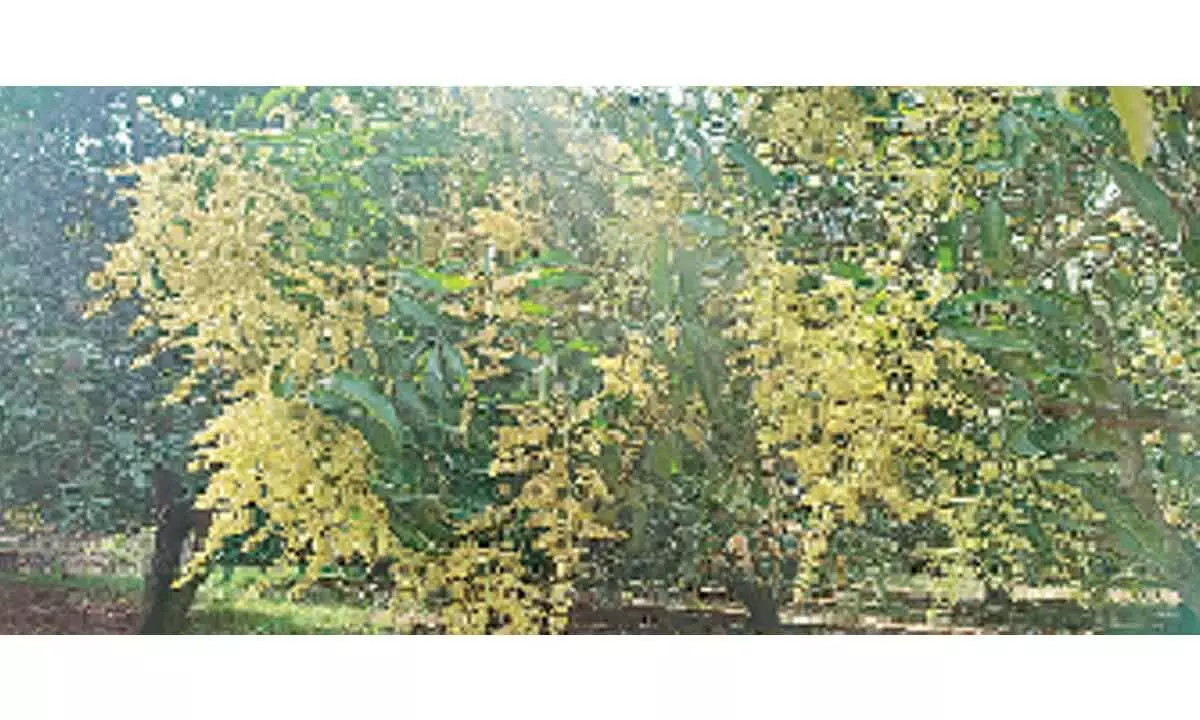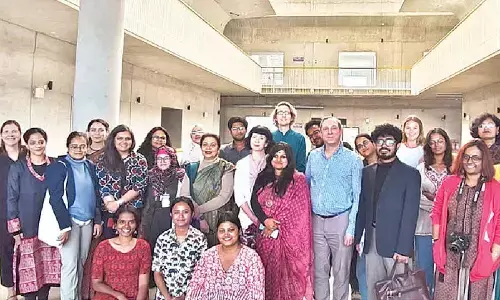Delay in flowering may hit mango yield

- Farmers lament that fog and rains spoil flowering aspects
- District Horticulture Officer BV Ramana suggests farmers to use fruit covers to protect budding mangoes from insects and fog
Tuni (Kakinada District): The abnormal delay in flowering of mango trees in Kakinada district may adversely affect the production and the prices may go up in the coming season. Farmers are afraid that fog will spoil the flowering prospects of mango, which will further delay growth and yield.
Though mangoes in a few acres came to flowering stage but, unfortunately insects have spoiled most of the flowers. The farmers complained that they couldn't buy pesticides due to their high prices.
A farmer M Veeranna said that a lot of money and time will be spent for second time flowering.
According to Horticulture officials, there are nearly 7,250 hectares of mango fields in the district. Normally, mango varieties like Suvarnarekha, Banginapalli and Rasalu should have completed flowering stage in mid-November and December and other varieties like Kotpalli Kobbari, Panduri Mamidi, Totapuri etc will come to flowering stage in January. But only Nuziveedu and other varieties in AP came to flowering stage.
Speaking with The Hans India, a farmer from Tuni mandal Kanireddy Raju said that only 40% mango trees came to flowering and the delay will lower both size and quality of the fruit. This will make the prices to drop, causing loss to the mango growers.
Raju said that he is cultivating mangoes in 30 acres in Tuni mandal. He said that they will get Rs 70,000 to Rs 80,000 after spending Rs 40,000 per acre and never will reach Rs 1 lakh. "We have to spend Rs 25,000 per acre for pesticides, which should be sprayed six to seven times per each acre. Sometimes mangoes will fall during ripening stage due to unexpected rains." Raju said that he had invested Rs 10 lakh for mango garden and got a profit of just Rs 50,000 to Rs 80,000 last year. Now the expenses have been doubled in view of labour and pesticides, they can't expect even a marginal amount of profit, he lamented.
Another problem that haunts the farmers is labour wages. A worker demands Rs 500 to Rs 600 per day from 6 am to 12 noon. It is very difficult to engage labour for full day. Farmers lamented that their investment will be more than the profits they get, as the prices are unpredictable. They said prices will come down when there is high demand for the fruits. Much of the produce of mangoes is marketed to other states like Odisha, Bihar, West Bengal and New Delhi.
District Horticulture Officer BV Ramana told The Hans India that certain variety of mango could not bloom, due to incessant rains in October and November as happened last year. Confirming that the flowering of mango trees is delayed due to fog and rains, he informed that 80% of trees are in flowering stage and 60% of mangoes were dropped already. The remaining will bear fruit. Ramana informed that they are creating awareness among mango farmers about its yield through YSR Thota Badi
programme. He suggested the farmers to use fruit covers to protect budding mangoes from insects and fog. He added that the government has already provided subsidy for fruit covers.
Stating that more than 10,000 mango farmers are working for mango yield in the district, District Horticulture Officer Ramana said farmers earned good profits from mango trade last year. He suggested the farmers to consult Rythu Bharosa Kendrams and Horticulture department to protect mangoes in the initial stages. He informed that majority of mangoes would be exported to West Bengal, Bihar and New Delhi.

















